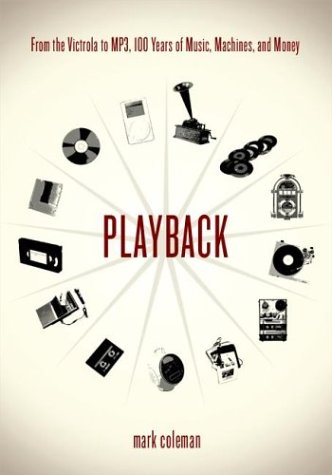 |
||
|
|
Playback:
From the Victrola to Mp3, 100 Years of Music, Machines, and Money.
|
 |
BY RICHARD PACHTER
Originally published on Monday, March 8, 2004 in The Miami Herald.
Feb. 24, 2004 was Grey Tuesday. Did you miss it?
On that day, a collection of recorded music combining raps from
The Black
Album, by hip-hop artist Jay-Z, with audio samples from The White
Album,
which The Beatles produced in 1968, was downloaded by thousands,
if not
millions of people.
The music was posted on more than 170 websites to protest EMI Music,
owner of The Beatles tracks, and their policies. The same policies
had prevented Danger Mouse, the artist responsible for the combined
work called The Grey Album, from legally distributing his collection,
Mouse said.
The episode is a perfect example of some of the most serious challenges
facing the music industry: digital downloads, sampling, copyright
law, distribution and more. It may involve cutting edge technology,
but it's nothing new.
BOOK EVOLVES
Mark Coleman's recent book, Playback, is a compact history of the
technology of the music business. He says that this project was
originally supposed to be a history of the turntable, but he eventually
realized that the real story was about the technology that has reproduced
music, of which the
turntable is only a small part.
At almost every turn, music's mercantile status quo vigorously resisted
new technology, viewing it as a threat. Sound familiar? Today's
protestations by record companies and music publishers echo their
past refrains. When radio stations began playing recordings of popular
bands in the 1920s, musicians' union chief James Petrillo railed
against ''canned music'' and did everything he could to prevent
the broadcasts. He failed.
Coleman goes on to discuss the various high- and low-lights of the
business and its technology, each of which seemed to pose a colossal,
cataclysmic, survival-threatening challenge to the health and vitality
of the music business. Generally, he gets high marks for covering
such a vast amount of material, with diverse personalities, technologies
and other issues.
THOROUGH REPORTING
His informal prose style is certainly appropriate to the subject
matter, and his background as a journalist ensures that pertinent
names, dates and other facts are included. As well, his general
familiarity with the music industry's idiosyncratic and arcane business
practices is useful, though apparently limited.
While it's clear, for example, that shortsightedness, ignorance
and avarice are leading contributors to the current dire straits
of the music business, the problem is much deeper. The latest strategy
involving stupidly suing its would-be customers for downloading
songs, instead of wisely monetizing thisbehavior, is just the most
recent repackaging of an old stiff.
Observers such as writer Bob Lefsetz and musician Todd Rundgren
advocate embracing the opportunities created by file-sharing and
digital downloads, but industry executives resist. It's the same
old song and dance.
Coleman does a good job of reporting history, but gets only a passing
grade for his analysis. Just as the turntable was only a component
of a larger story, so too is the use and misuse of technology. How
record companies and music publishers deal with the artists who
create the content they trade in and the customers to whom they
promote it is the bigger, more textured and meaningful story.
Coleman's book is a decent single, but where's the album?
LEARN MORE ONLINE
Todd Rundgren's commentary
in The Hollywood Reporter.
Commentarries by Lefsetz are here
and here.
To learn more about 'The Grey Album,' go to: http://www.greytuesday.org
Like business books? Join the club.
©2004 Words on Words, All rights reserved.